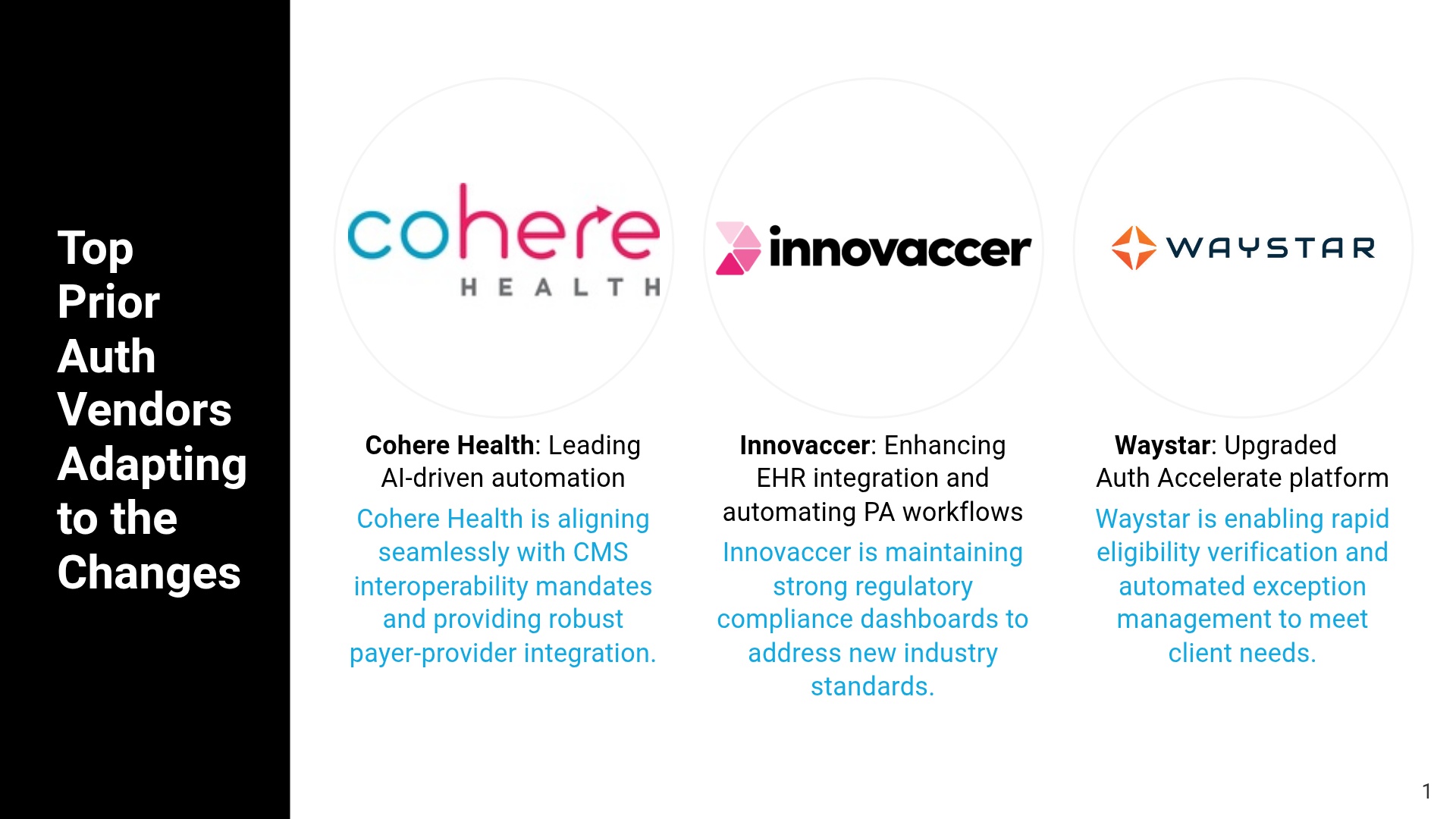Black Book Research identifies Cohere Health, Innovaccer, and Waystar among leading vendors rapidly adapting to new industry rules.
NEW YORK CITY, NY / ACCESS Newswire / July 26, 2025 / U.S. healthcare is undergoing a pivotal shift as major insurers-led by UnitedHealthcare and Humana-begin to significantly reduce or eliminate prior authorization (PA) requirements for hundreds of routine procedures. Accelerated by federal policy, provider frustration, and consumer demands for timely access to care, these sweeping changes signal a new era in PA technology and operations, according to a July 2025 flash survey conducted by Black Book Research.
Industry Drivers: Regulatory Action Meets Provider and Consumer Pressure
Insurers covering over 250 million Americans have committed to streamlining or removing PA burdens by the end of 2026. This is partly driven by the Centers for Medicare & Medicaid Services (CMS), which is launching a pilot program in six states in January 2026 requiring faster, more transparent prior authorizations for select Medicare services. CMS has also announced national response time standards for Medicare Advantage plans, further intensifying the need for automation and interoperability in PA processes.
Key Survey Insights from the Field
Black Book Research's flash survey compiled viewpoints from: 24 IT leaders representing the top 10 PA vendors; 108 managed care and health plan IT and operational decision-makers; 142 healthcare providers and administrative leaders; and 100 healthcare consumers with recent PA experiences.
Notable Findings:
84% of managed care executives support reducing PA requirements
96% of healthcare providers report improved workflows and lower administrative burdens
99% of consumers favor eliminating PA for routine care; 83% say they've experienced harmful care delays
67% of health plans expect to reevaluate or end contracts with existing PA vendors by 2026
Additional Observations:
90% of providers foresee broad adoption of interoperable PA tools by 2027
94% of payers plan substantial investment in AI-based PA platforms
100% of consumers prefer providers with automated and transparent PA processes
96% of PA vendor executives acknowledge their current solutions require modernization within two years
__________
Vendors Rapidly Adapting and Leading the Innovation Curve: Client Top KPI Scores
Black Book highlights the top-performing vendors already making critical advancements to align with industry shifts:
Cohere Health - Excels in AI-based automation, payer-provider integration, and CMS-aligned interoperability
Innovaccer - Offers strong EHR integration and regulatory compliance dashboards for PA workflows
Waystar - Enhancing its Auth Accelerate platform for real-time eligibility checks and exception handling
ScribeRunner - Developing dynamic auto-approval rulesets and real-time tracking modules
CoverMyMeds - Expanding AI-powered real-time authorizations for both pharmacy and medical benefits
Change Healthcare - Transitioning legacy infrastructure with modular FHIR APIs for automated decision-making
Availity - Driving advanced API adoption and digital submission channels
PriorAuthNow (Rhyme) - Connecting providers and payers through real-time electronic submission with limited manual effort
Black Book's Q1-Q2 client satisfaction rankings show these vendors excelled across 18 qualitative KPIs for PA technology. Cohere Health earned the highest overall honors, with MCG Health, eviCore Healthcare, Agadia, Infinx, and Availity also receiving good marks. Onyx led in FHIR-based PA platform innovation. Detailed competitive intelligence reports are available in the Black Book research store.
__________
Vendors Facing Existential Threats in the New Era
Not all companies are poised for success. Several previously top-rated PA vendors now face considerable risk due to outdated systems and slow adaptability:
eviCore Healthcare - Still dependent on manual review processes, with limited AI capabilities
HealthHelp (WNS) - Lagging behind in interoperability and modern payer integration
PriorAuthNow (Rhyme) - Despite innovation efforts, struggles with scalable real-time API integration threaten its long-term viability
_________
Looking Ahead: A Positive Outlook for Adaptive Vendors
While legacy vendors must evolve rapidly or risk market exit, the broader outlook for PA tech is optimistic. Companies investing in automated, intelligent, and interoperable systems are well-positioned to thrive. "The future of prior authorization is transparent, automated, and fully integrated into clinical workflows," said Doug Brown, Founder of Black Book Research. "Vendors delivering real-time, AI-powered solutions will define the next generation of care access efficiency for providers, payers, and patients alike."
About Black Book Research
Black Book Research is a leading healthcare IT research firm known for its independent, vendor-agnostic approach. Over the past 15 years, Black Book has collected over 3 million survey responses from nearly 500,000 healthcare professionals. The firm's flash surveys and long-form evaluations provide real-time, unbiased insights that support strategic decision-making across the healthcare ecosystem. Visit www.blackbookmarketresearch.com or contact research@blackbookmarketresearch.com for full survey results and vendor-specific performance details.
Contact Information
Press Office
research@blackbookmarketresearch.com
8008637590
SOURCE: Black Book Research
View the original press release on ACCESS Newswire
